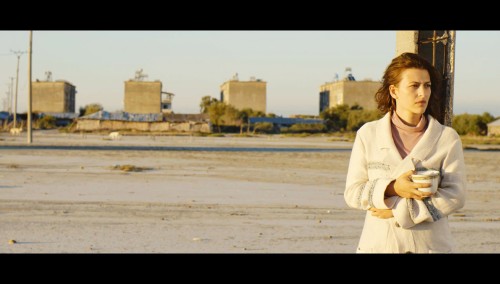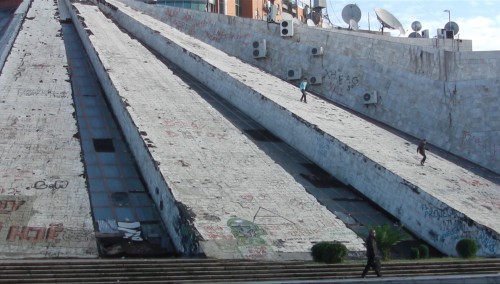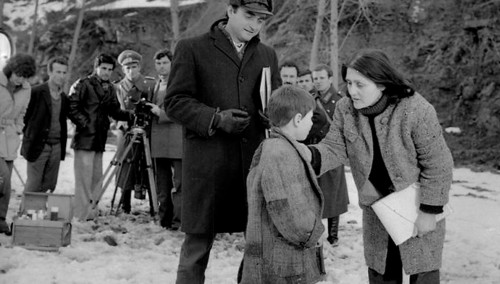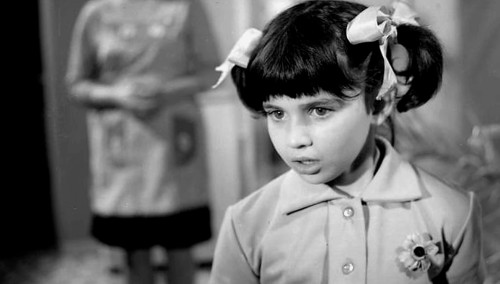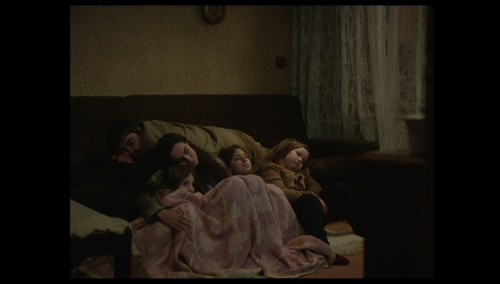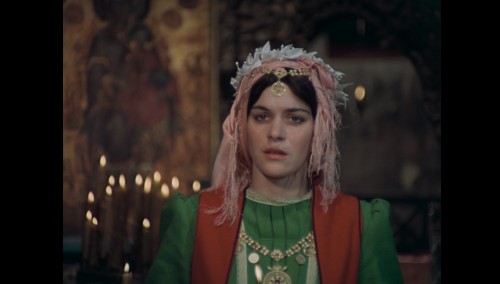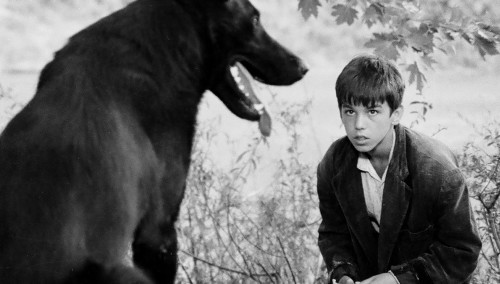Nach der preisgekrönten Regisseurin Yeşim Ustaoğlu aus der Türkei und der rumänischen Erfolgsproduzentin Ada Solomon rückt CROSSING EUROPE nun zum dritten Mal eine im europäischen Filmbereich tonangebende Filmschaffende ins Zentrum der Programmsektion SPOTLIGHT. Heuer fiel die Wahl auf die umtriebige Iris Elezi aus Albanien, die bereits 2015 persönlich ihren ersten Langspielfilm BOTA (IT/AL/Kosovo 2014) dem Linzer Festivalpublikum vorgestellt hat.
Iris Elezi kam nach ihren Studien in den USA (u.a. an der TISCH School of Arts, NYU) nach Albanien zurück, wo sie sich neben ihrer Tätigkeit als Regisseurin, Produzentin, Drehbuchautorin und Lektorin ganz dem filmischen Erbe Albaniens und dessen Bewahrung verschrieben hat. Siebenundzwanzig Jahre nach dem Sturz von Albaniens isolierter Diktatur stalinistischer Prägung ist immer noch wenig über das Kino dieses südosteuropäischen Landes bekannt. Iris Elezi ist als Mitbegründerin der Initiative The Albanian Cinema Project maßgeblich daran beteiligt, die nationale Filmsammlung nicht nur materiell zu erhalten, sondern auch ideell. So werden u.a. Filmvorführungen organisiert, um die Bevölkerung für das Filmschaffen der Zeit der Diktatur zu sensibilisieren, das verständlicherweise von vielen Menschen nach wie vor abgelehnt wird. Iris Elezi beschreibt ihre Bemühungen um die kritische Neubewertung des albanischen Filmerbes, das zweifelsohne auch zur Bildung einer kulturellen Identität beitragen kann, folgendermaßen: „Wir müssen uns von dieser kollektiven Amnesie befreien.“
Die Filmauswahl für ihre Carte blanche teilt sich zwischen einem historischen Programmteil und aktuellen Produktionen auf. Neben drei Spielfilmen der zur Entdeckung empfohlenen Regisseurin Xhanfise Keko aus den 1970ern umfasst das historische Programm noch einen Komödien-Blockbuster der Post-Hoxha-Ära, verantwortet von eine der zentralen Figuren des albanischen Kinos, Dhimiter Anagnosti. Im „aktuellen“ Programmteil bietet sich der mit zahlreichen Fakten gespickte Dokumentarfilm Mark Cousins als idealer Einstieg in das filmische Universum Albaniens an, das international bisher noch kaum rezipiert wurde. Ergänzt wird dieser Teil noch um zwei weitere Spielfilme, neben BOTA von Iris Elezi kommt noch der ganz aktuelle und erfolgreich auf zahlreichen internationalen Festivals gelaufene Titel Nëntor i ftohtë von Ismet Sijarina zur Aufführung.
“We must rid ourselves of this collective amnesia.” Iris Elezi on preserving Albanian cinema
by Jurij Meden (Head of Film Programat the Austrian Film Museum, Vienna)
Jurij Meden: Dear Iris, given the immense diversity of your engagements, is there perhaps a difference in your approach to these different roles?
Iris Elezi: I can humbly say that I do not take a different approach to being an advocate for the protection of our endangered archive and being a filmmaker. All I can do is move forward on both fronts to the best of my ability. My own professional growth has been difficult and amazing,and like much in real life, it makes sense only in due time
For example, I recall while studying film theory and criticism at the University of Lincoln, Nebraska – UNL in 1995, no one in my country understood why I would study film theory and criticism first if I had wanted to be a film director since I had been in 7th grade in communist Albania. And then, I distinctively recall having a moment of joy after successfully conducting a 90-minute master class with Francis Ford Coppola at the Durres International Film Festival back in 2012. At the end, I shook his hand, smiling, and said: “Now my parents have a better idea why I became the first Albanian filmmaker that studied film theory and criticism."
”Would we be correct to assume that you are performing certain of your duties out of inner necessity and inspiration, as a vocation and something that gives you energy, while others are simply tiresome but tremendously important work needs to be done, and nobody else will do it if you don’t?
Coming from an isolated culture like mine, I had to create my own path. My attention was drawn to the conditions in our archive seven years before I stepped into the shoes of the director of the Albanian National Film Archive (AQSHF). We took some Dutch artists to visit the AQSHF complex on the outskirts of our capital where our entire film heritage is stored. Even as we walked through the front door,there was no escaping the smell of vinegar coming down the hall from the vaults. When we entered the main negative vault, we put our hands out and touched the wall. It was wet with mold and condensation. From that moment on, I was determined to do everything I could to stop Albania's films from dissolving into vinegar.
At the time, I was doing rewrites and pre-production on my first feature film Bota. I was well aware that if I did not do anything, nobody else would. The staff at the archive had done the best they could with what they had. However, they were unable to go out into the world and make a case for Albanian film, as I have been able to. I studied filmmaking in the USA and feel fortunate that I belong to that generation that got to shoot and edit on 16 mm film at NYU, while also in my last year, AVID became available for editing. In addition, I belong to the Albanian generationthat still remembers the past regimeand our way of life, therefore I strongly feel that I have an obligation both to the past and to the future.
It is a huge responsibility knowing that the damage that is happening to our film legacy is irreversible. That is why I am simply putting to good use my knowledge and network as a filmmaker. Of course, I am still learning what film preservation is all about. Yet I think everything that I do in the archive – from programming screenings to interviewing surviving directors from our communist time – has deepened my understanding of Albanian film legacy and the need to save all of it. I hope that this in turn will inform my filmmaking craft. So yes, it is true.
I could not sleep calmly knowing what I knew about the dire situation at AQSHF, just as I knew well that no one else was going to try to look beyond our borders for archival support. Therefore, we established the initiative The Albanian Cinema Project ACP with the fantastic American archivist PhD Regina Longo, and now much of it is part of the history books.
The program you have curated for Crossing Europe lies at the crossroads between Albania’s past and present. A simplistic approach to Albania’s recent (not only film) history is always centered around the upheaval that represents the end of the so-called Hoxha era. How did, in your opinion, Albania’s filmmaking succeed in transitioning into a new era? Can one talk about trends or strains of filmmaking in Hoxha’s times,and how diverse is Albanian filmmaking today? Moreover, just how influential is the memory of those times for contemporary Albanian filmmakers?
This past summer, I programmed an extensive eighteen-week retrospective of Albanian cinema from the 1990s. These were films made in the first decade after the fall of the communist dictatorship under our leader Enver Hoxha. On the roof of the old Soviet-built Palace of Culture, outdoors, we screened not only fiction films and documentaries but also an incredible selection of rarely seen animations. The audience was mostly young people who had been just babies when these films were made. The atmosphere during the screenings was electric. You could feel the energy in the audience, a kind of shock of the unknown. It is important to understand that during the 1990s, all these Albanian filmmakers no longer had government support. All these films were made independently; some were made under incredibly difficult circumstances. During these tough years, my country went through many different crises. Some of these films took years to complete. What really struck me about the rooftop shows was meeting audiencemembers afterwards and realizing none ofthem had seen these films before. Albania was in so much chaos then that the filmswere often seen only a couple of times andthen completely disappeared.
This is one of the key dangers in our culture.We are so eager to move into thefuture that we cannot look back at thepast. I think it has been difficult for us asAlbanians to shake off the years underEnver Hoxha. The rule was so absolute. All religious faith was banned, all artistic expression was controlled. Even names for babies had to be approved by thestate. A trauma like this is deep. It will take years to heal. I really think the films from the communist era are endlessly fascinating,now even more as historical documents of a time long gone by ... It is true we did not have a cinema of dissent as they did in Poland, Czechoslovakia and Yugoslavia. Nevertheless, Albania does have wonderful examples of films made out outside the confines of socialist realism like the amazingly satirical Kapedani (1972), a film whose directors had to atone for later. Each of these films provides extraordinary evidence about four decades of life under totalitarian rule.
The discovery of Albanian movies from the 1990s by young people this past summer shows the impact of our archival programming. Creating Albania's first cinematheque helps to mend the disconnect people have with their own movie heritage. If our young artists want to be the nextgeneration of Albanian filmmakers, then they have to understand what has come before. It is as simple as that. We must rid ourselves of this collective amnesia. Only then can there be healing and stronger cinematic works.
Even the most well-informed cinephiles usually draw a blank when it comes to Albanian cinema, probably the blindest of all blind spots on the horizon of your average European film viewer. Nevertheless, as soon as one scratches the surface, astonishing riches appear that could stand side by side with any other European film history. How do you explain this odd situation that persists even today, and what are the greatest obstacles on your mission to preserve and promote Albanian culture?
One of the greatest obstacles to getting Albanian movies to the outside world comes from Albania itself. I think there is a lot of residual shame people feel about the films made during the communist time. The control was so rigid, the terror reached into every corner of people’s lives. Only the dreams we had while we were sleeping were our own. If you dared to stand up and speak out, you and your entire family could be sent to a prison camp. There is so much lost opportunity in our cinema. A man who could have taken Albanian documentary to unexpected places, Viktor Stratoberdha, was accused of making a joke about Enver Hoxha and locked away for thirty years. There were many actors, actresses and directors who were sucked into this maelstrom. Everybody lived in fear. Many people now do not want to think about this time. It is just too painful. For many years, almost noneof the films from the communist era weresubtitled into other languages. I think the complicated feelings people have about this time and what these films represent are at the root of this. However, if Albanians do not move past this and do everything we can to protect and preserve these images, we will be lost as a people. To rob our future generations of historians anddirectors of these films is criminal.
That is why we have been working hard to translate our films and to share them with academics and festival programmers around the world. We know that it is the only way to generate interest beyond simple nostalgia. In the meantime, I am proud to share that there is a new generation of Albanian film critics being educated abroad. I bet their fresh perspectives on to our cinematic legacy will soon be echoed in books we intend to publish at AQSHF. You are correct, Albanian film has riches waiting to be discovered. Just as the 2016 poster exhibition at the Albanian National Art Gallery – GKA showed, the Albanian poster graphic art tradition deserves critical attention and exhibition, just as much as the Czechoslovakian one. In addition, our film music and Albanian film animation are truly unique and priceless. In away, I envy all the film scholars who will soon discover them, for in the times we live in it is almost impossible to be and feel like a pioneer, yet for the courageous oneswho will take the journey into the Albanian unknown cinematic practices, their patience and love will surely be rewarded.

Jurij Meden, Österreichisches Filmmuseum

